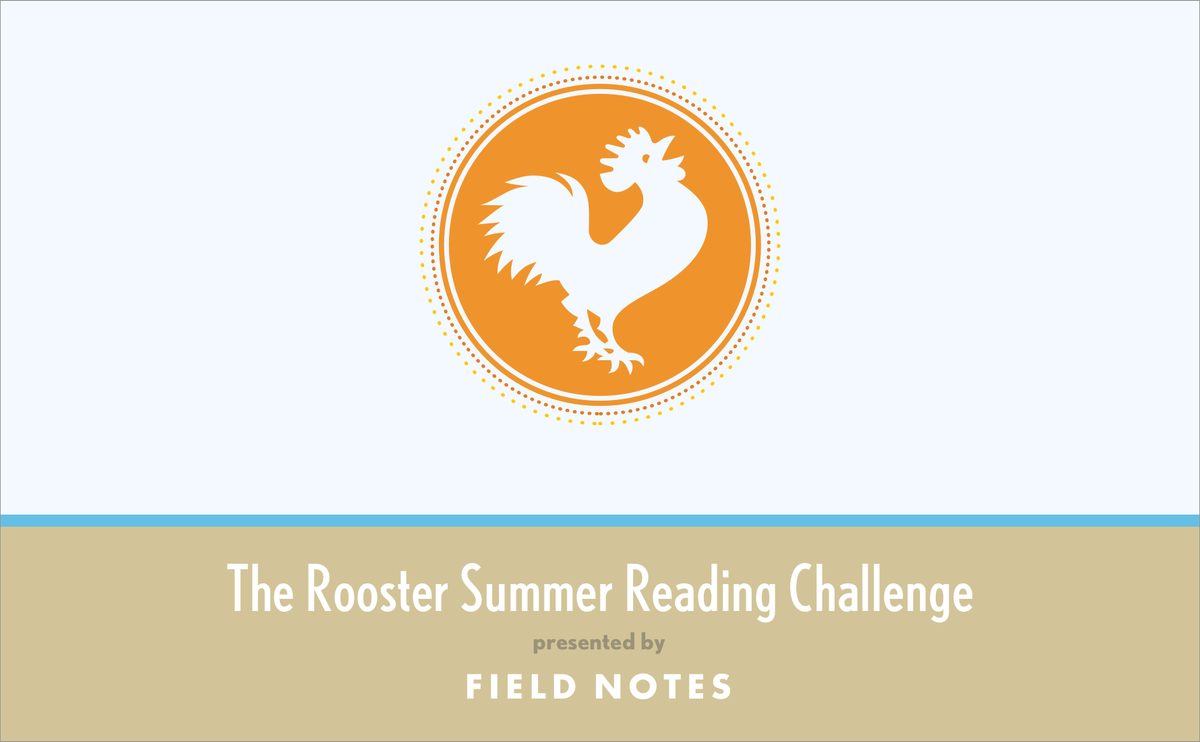The Rooster Summer Reading Challenge: Week Three
We've wrapped up our first book in the Rooster Summer Reading Challenge, and now we're waist-deep into The Night Ocean. Joining us to discuss is this month's judge, Victor LaValle, who, lucky for us, knows his Lovecraft.

Welcome to the Rooster Summer Reading Challenge, brought to you by The Morning News Tournament of Books and our presenting sponsor, Field Notes. All summer long, we’re reading two novels a month and reconvening on Wednesdays to discuss the books. Joining our chats is a monthly guest judge, who at month’s end decides which title heads to our summer championship on Aug. 30—when you choose which book gets an automatic berth in the 2018 Tournament of Books.
For June we’re reading A Separation by Katie Kitamura (selected by the ToB Committee) and The Night Ocean by Paul La Farge (chosen by Amelia Gray, who will be joining us in July), with novelist Victor LaValle.
- Catch up on previous discussions: Week one, week two
- See the summer reading books and schedule
- Jump into this week’s discussion in the comments
Last week we finished A Separation, and this week we’re discussing the first half of The Night Ocean, through page 190.
Rosecrans: Let’s kick it off. To start, I knew nothing about this book coming in except that it was picked by our Rooster Summer Reading Challenge visiting novelist for July, Amelia Gray. Then, about 20 pages in, I wondered, What the hell am I reading?
Victor LaValle is the author of the short-story collection Slapboxing With Jesus, three novels, The Ecstatic, Big Machine, and The Devil in Silver, and two novellas, Lucretia and the Kroons and The Ballad of Black Tom. His latest novel, The Changeling, was published on June 13.
Rosecrans Baldwin is the author of You Lost Me There and Paris, I Love You but You're Bringing Me Down. His nonfiction appears in a variety of magazines, most often in GQ. He co-founded TMN with publisher Andrew Womack in 1999. His latest novel, The Last Kid Left, was published on June 7.
A quick summary for anyone who hasn’t started yet, here’s the opening premise: Marina, a psychiatrist, has a missing husband, Charlie. Charlie lately got interested in the deceased horror writer H.P. Lovecraft—specifically a part of Lovecraft’s life when he lived for two months with a teenage fan named Barlow. What Lovecraft and Barlow were up to is a little mysterious, and Charlie thinks he’s got it all figured out, but then everything goes to hell and Charlie disappears, possibly by suicide.
I want to mention to everyone that the fact that we’re reading this book in June rather than July or August was a mistake on our part. In all the production and scheduling leading up to the summer, trying to match the right books with the right judges and getting people’s schedules matched properly, we inadvertently matched Victor with a book that he blurbed as “straight up brilliant”—a book that he warned us ahead of time that he’d blurbed. Commentariat, this was our error; we put a judge in place to read two books as objectively as possible who’d already said he loved one of them. And, unfortunately, by the time we’d realized the mistake, it was too late to pull back. We’ll figure out a way through this. Thanks, and our apologies.
So we move forward. Victor, what’s it like to re-read the book now? When did you first encounter this novel?
Victor: First, I’m happy to be back to talk some more. I have to tell you after the first week of discussion went up, I came back to read people’s comments/discussions. I hope it won’t feel like I’m blowing smoke up the collective asses of the readers here but I was genuinely impressed by how seriously folks took each other—even as there were some fun tangents that were only somewhat related to the book! It felt like real conversation, is what I mean, and I’m happy to be a part of it.
Thanks, also, for letting people know about the blurbing issue. At some point someone might turn this book over and see my praise there. I’d hate for it to sour any of the conversation to come. Being direct almost always seems best to me.
Rosecrans: Yeah, but to make it extra clear to everybody, you’re not culpable here in the slightest—it’s our mistake.
Still, let’s take a moment to talk about blurbing. Whenever you look on the back of a book and see those short quotes written by other authors—those are there because the author of the book, or their editor, agent, or publicist, reached out to somebody and asked for an endorsement to kick-start people’s notions around the book. (Inside-baseball note: Almost always it’s the author doing the asking.) Connections and friendships play a major part in the process—and therefore you also see a lot of hyperbole. Also scenarios like authors who refuse to blurb, authors who only blurb for former students, authors who only blurb for friends. Or some authors who blurb so much you don’t understand when they find time to write.
For my part, I’m happy to consider a book for a blurb, but I never promise anything; I don’t want to be caught in a situation where I’m on the record saying stuff I don’t believe. And wow, I hate asking for blurbs. To the point that I only reached out to two people for my new book, and both declined, hence it came out blurb-less. Basically, from a business perspective, I’m an idiot. What’s your blurbing policy?
Victor: I blurb former students semi-regularly; in some ways these are the easiest to do. I’ve likely read a lot of the person’s work before, maybe even the book they’re publishing. So there’s a pleasure in seeing what the writer has done, how much they’ve improved since being a student in my classes. I also read/blurb for friends, but not only that. Sometimes a person has reached out (through an agent or editor or a friend) and I’ve had free time to read and I just enjoyed the book so I wrote a blurb. I never promise I’ll give a blurb, I say I’ll be happy to read. The other reality is that even when I want to give a blurb I sometimes run out of time. That’s the worst because I may have enjoyed the book but couldn’t get through it quickly enough to offer some supportive words.
Rosecrans: One consequence of our blunder, as explained above, is that, unlike the other months this summer, Victor won’t be handing down a verdict next week between the two books, deciding which one advances to the summer’s final face-off. Not all blurbs are the same, but Victor is obviously sincere and judicious in his endorsements; even if none of you read or care about blurbs—in fact, plenty of people in the industry don’t feel blurbs do much to influence anybody except for the publisher’s own salespeople, who need a little fire in their bellies to get excited about yet another a book—instead we’d like to turn it over to you, the readers. How should we handle this one? We’re offering two options:
- I will become the judge to decide between these two books, based on my own reading experience, my assessment of Victor’s comments, and my reading of the Commentariat’s opinions; or
- You, the Commentariat, will vote for a winner next Wednesday by leaving a comment in our final discussion of The Night Ocean.
Thanks again, and now back to the discussion of the book in question.
Victor: As for your reaction about the book—“what the hell am I reading?”—I wonder how you’re feeling now that we’re halfway through. The movements and phases the book goes through can really make it feel like a whole new book has begun, even as I see Paul pulling threads through, weaving them together. It’s such a wonderfully heady book and, I think, almost swaggering in its confidence. That seems a little strange to type considering that neither Barlow nor Lovecraft strike me as the swaggering sort. The book, on the other hand, is so sure of itself.

Field Notes Limited-Edition for Summer is Campfire. Campfire features three original photos that have been line-screened and carefully spot-printed, for a vintage feel, and each pack comes with a custom “Campfire Master” patch, ready for your scout sash or messenger bag.
Rosecrans: Absolutely. And halfway through, I have no idea where this book is going. But I’m captivated—I enjoy the sense of burrowing into a novel, If on a winter’s night a traveler-style. The Barlow-in-Mexico section is my favorite so far, Barlow is thrillingly alive in those moments. Whereas Section One (“A Result and a Prologue”), with Marina’s narration, didn’t do much for me. I find her unconvincing on a couple fronts, and I don’t quite buy the establishment of her and Charlie’s relationship; so much was being force-fed to me, is how it felt.
Victor: I wondered, also, at the funny coincidence that both of the books in this month’s matchup are about missing husbands. The universe is trying to get us to think about something…absence? The role of the person who is left behind? I don’t know, but it’s funny to note.
Rosecrans: I was thinking the same thing. Two books, two missing spouses—I wish we’d hired the movie trailer guy to do a voiceover setting up this match.
Victor: It’s going to sound odd, but this time around I felt much more affected by the unrequited love story of Barlow and Lovecraft. When I read this book to blurb it, I admit I was rolling with laughter as I read the entries in the Erotinomicon. Even more so because I knew some of Lovecraft’s most ardent supporters get tense when discussing the man’s sexuality. I admit to a small amount of pleasure at the idea of their discomfort. It’s petty, but I’m that way sometimes. But as a result I don’t think I truly appreciated the shift La Farge pulls off when he gets around to what “really happened.”
This time around I came away with a deeper interest in the idea of Lovecraft as that night ocean, the profoundly overwhelming and incomprehensible mystery of the man, of any human being.
Rosecrans: You’ve written horror yourself, of a LaValle-variety, and also novels with fantastical elements. (I’m thinking of The Devil in Silver primarily, and your new novel, The Changeling. I’ll get to The Ballad of Black Tom in a second.) Can you tell everybody how much you knew about Lovecraft coming into this?
Victor: I’ve been a Lovecraft fan since I was about 10 years old. I first read the man’s stories in a reprint edition put out by Del Rey Books in the ‘80s. Me and Howard go way back. So I felt a special tenderness for this book, for La Farge’s project, from the moment I heard about it.
What about you, were you a Lovecraft devotee? If not, what was the experience like for you when you realized this book wasn’t going to have a glancing interest in Lovecraft, but would dive deep instead?
Rosecrans: I’ve never read a single Lovecraft story. All I knew was his name, his reputation, his influence on people like Stephen King. So everything’s a surprise to me. But I don’t feel the novel requires Lovecraft love a priori. I haven’t felt put out by being ignorant.
And wow, I certainly didn’t know he’s a diehard racist. Let’s dig into that for a moment. Your novella, The Ballad of Black Tom, is in part a response to Lovecraft’s racism—his fear, his hatred, his backwardness. Can you talk a little about what went into writing that book? And what’s it like to see La Farge’s Lovecraft on the page, rendered very sympathetically (in my opinion)?
Victor: My novella dove directly into some of the ugliest aspects of Lovecraft and, by extension, white supremacy as an artistic and political viewpoint. How do you love something and still criticize it? This was what I wrestled with because I undoubtedly loved, and still love, Lovecraft’s writing. Even the bad stuff can generate a little warmth from me. But that’s not the same as excusing it. Which is what Lovecraft’s apologists do. They often seem incapable of holding two ideas as being simultaneously true. Lovecraft was brilliant, Lovecraft was profoundly prejudiced. The end. The backflips people go to in order to make the truth one or the other is baffling to me.
Of course, I think the most brilliant move on La Farge’s part is to pivot away from Lovecraft and focus on Barlow instead. Once a person becomes cemented—even if it’s only on a cult level as it was for Lovecraft for so long—it becomes difficult to reanimate them. I remember long ago when Norman Mailer wrote a novel from the point of view of Jesus, The Gospel According to the Son. I loved him for the absolute, batshit audacity of the move but I can’t say that he was able to invest the carpenter from Nazareth with anything new or surprising. Instead, his Jesus read more like Norman Mailer. The better results usually come from that sideways take on the legendary being. I’m thinking of something like Wide Sargasso Sea by Jean Rhys.
As for the details of their lives, I had some basic knowledge of Lovecraft’s life and knew the names of his inner circle, but much of what’s here was pretty new. Of course, I’m fairly sure La Farge is sprinkling in a few things that were invented by him entirely, but after a while I don’t know how much it mattered to me. I’m quite sure there are some, the High Priests of Lovecraft, who won’t be able to survive a single speculation or straight-up falsehood, but you can’t please every reader. The experts least of all.
Rosecrans: Thus far, I have no idea, really, what’s fact or fiction in this book. But I’m staying away from Wikipedia until after I finish. Where are you on this issue?
Victor: I’m interested in pushing farther into this territory. When you read something like this, how much fact mixed with fiction can you tolerate? I wonder what will be the breaking point? I’m thinking of, say, a World War II novel where suddenly a soldier rides in on a Tyrannosaurus Rex. That’s probably going to break the spell, I admit. But short of that, what can we get away with? Or, to put it another way, how scrupulous should a writer have to be to the facts? I tend to think you use the facts right up until they ruin your story.
Rosecrans: It’s complex. As a reader, for me it’s exciting and unsettling. I try to let the novel pass through me, then I look for historical sources. The Rooster Commentariat went deep on this issue during the Tournament of Books this year while discussing The Underground Railroad. (Just one example would be the 447 comments on the first day of competition.) On the one hand, Whitehead got all the praise he deserves for conjuring his world and characters. On the other, people argued about his obligations to history and to his audience. And we heard anecdotes—perhaps revealing?—from the Commentariat and visiting booksellers about the number of people who now believe (or already believed) that subway trains were running under the Carolinas.
As a fiction writer, I freewheel, striving for the best fiction. A dinosaur in WWII sounds to me like a shitty story. Then again I’ve never written historical fiction, or gotten into defamation territory. My new novel plays with the thriller format and has procedural elements—and I did a modest amount of research on policing, I interviewed some attorneys. But I never cared if a law professor would one day rip it to shreds as a portrait of our legal system. I’m interested in trying to get into someone’s mind, to put the reader in someone else’s mind. I guess, as both a reader and a writer, I want a novel to be a novel, self-contained, not be compelled to function as a textbook.
Victor: I do worry about this Whitehead anecdote as a criticism of the book. If a person’s only encounter with the history of slavery is Colson’s novel, then that’s a person who was never terribly interested in learning about slavery anyway. Maybe a more generous perspective would be to hope that such people, when told they’re incorrect, will take the time to go read some nonfiction about the subject. Then again there are plenty of people who believe the founding fathers were essentially Evangelical Christians so maybe people won’t let facts get in the way of a good story.
Rosecrans: What do you think, Commentariat, on all of this? Be sure to weigh in on how you think we should choose which of this month’s novel should move onto the final, and join us next week when we dig into the second half of The Night Ocean. See you in the comments.

